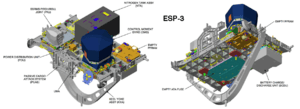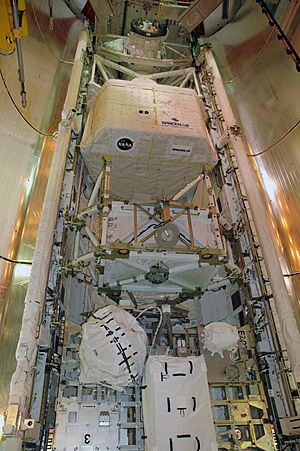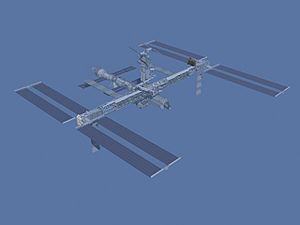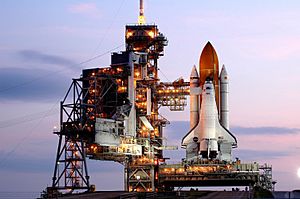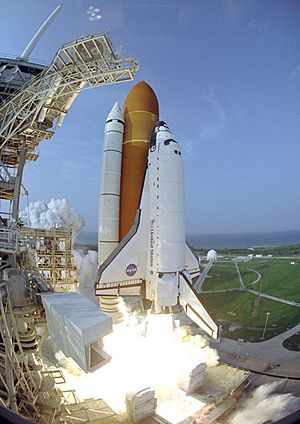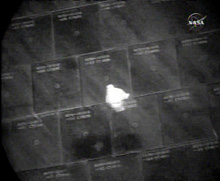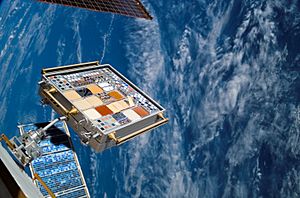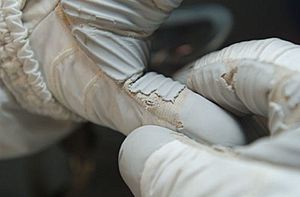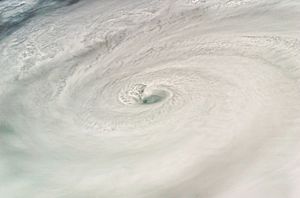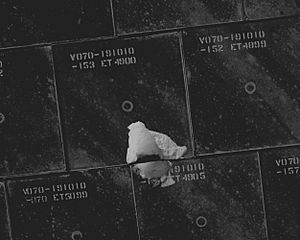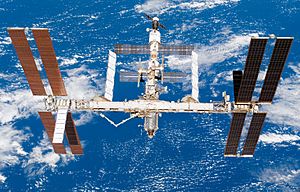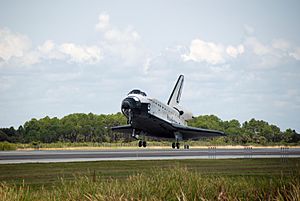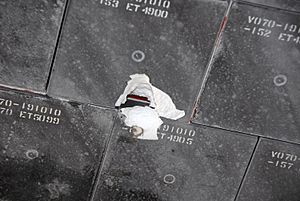STS-118 facts for kids
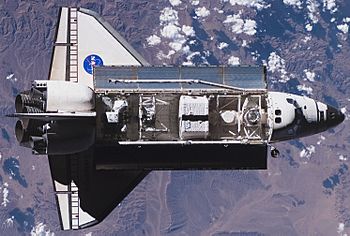
Endeavour rendezvous with the ISS
|
|
| Mission type | ISS assembly |
|---|---|
| Operator | NASA |
| Mission duration | 12 days, 17 hours, 55 minutes, 34 seconds |
| Distance travelled | 8,489,253 kilometres (5,274,977 mi) |
| Orbits completed | 201 |
| Spacecraft properties | |
| Spacecraft | Space Shuttle Endeavour |
| Launch mass | 121,823 kilograms (268,574 lb) |
| Landing mass | 100,878 kilograms (222,398 lb) |
| Crew | |
| Crew size | 7 |
| Members |
|
| Start of mission | |
| Launch date | 8 August 2007, 22:36:42 UTC |
| Launch site | Kennedy LC-39A |
| End of mission | |
| Landing date | 21 August 2007, 16:33:20 UTC |
| Landing site | Kennedy SLF Runway 15 |
| Orbital parameters | |
| Reference system | Geocentric |
| Regime | Low Earth |
| Perigee | 226 kilometers (140 mi) |
| Apogee | 226 kilometers (140 mi) |
| Inclination | 51.6 degrees |
| Period | 91.6 minutes |
| Docking with ISS | |
| Docking port | PMA-2 (Destiny forward) |
| Docking date | 10 August 2007, 18:02 UTC |
| Undocking date | 19 August 2007, 11:56 UTC |
| Time docked | 8 days, 17 hours, 54 minutes |
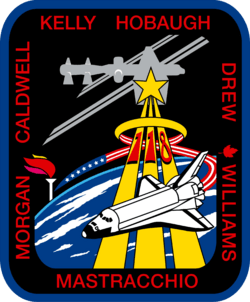 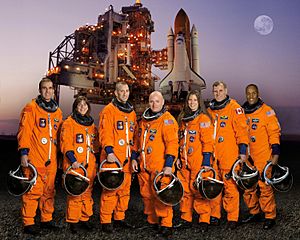 (left to right) Mastracchio, Morgan, Hobaugh, Kelly, Caldwell, Williams and Drew. |
|
STS-118 was a space mission where the Space Shuttle Endeavour flew to the International Space Station (ISS). It launched on August 8, 2007, from Kennedy Space Center in Florida. The mission ended when Endeavour landed back at Kennedy Space Center on August 21, 2007.
This was the first time Endeavour flew since November 2002. That earlier flight, STS-113, was the last successful shuttle mission before the Columbia disaster. During that disaster, the Space Shuttle Columbia broke apart when returning to Earth. Charles Hobaugh, the pilot for STS-118, was part of the team that talked to the Columbia crew during their last flight.
The STS-118 mission helped build the ISS. It added new parts and brought supplies for the astronauts living there.
During the mission, people worried about a small hole in the shuttle's heat shield. This hole was made by a piece of foam that fell off the external fuel tank during launch. Even though it caused some concern, NASA later said the damage was not serious. After the flight, experts said Endeavour looked very "clean" compared to other shuttles after their missions.
Contents
Meet the Crew
The STS-118 mission had seven astronauts on board. Here they are:
| Position | Astronaut | |
|---|---|---|
| Commander | Second spaceflight |
|
| Pilot | Second spaceflight |
|
| Mission Specialist 1 | First spaceflight |
|
| Mission Specialist 2 | Second spaceflight |
|
| Mission Specialist 3 | Second and last spaceflight |
|
| Mission Specialist 4 | Only spaceflight |
|
| Mission Specialist 5 | First spaceflight |
|
One special crew member was Barbara Morgan. She was the first "Mission Specialist Educator." This means she was a fully trained astronaut who used to be a teacher. She was the backup for Christa McAuliffe, who was part of the Teacher in Space program in 1986. Sadly, Christa McAuliffe died in the Space Shuttle Challenger disaster. Barbara Morgan continued to work with NASA and became an astronaut. She shared her space experiences with students during and after her flight.
Whether you're teaching school, or whether you're training as an astronaut, you put all you can into it, and get the most out of it.
—Barbara Morgan
Mission Goals and Cargo
The STS-118 mission had several important jobs. It carried and installed the S5 truss segment for the International Space Station. This truss is a large, metal structure that helps support the station. The mission also delivered External Stowage Platform 3 (ESP-3). This platform is like an outdoor storage unit for the ISS. A new Control Moment Gyroscope (CMG) was also brought up. CMGs help control the station's direction in space.
The mission also carried the Spacehab Logistics Single Module. This was a special container that fit inside the shuttle's cargo bay. It could hold about 6,000 pounds (2,700 kg) of supplies and research projects for the ISS. It also brought back items from space, like the MISSE PEC 3 & 4 experiments. These experiments had over 850 different materials that were studied to see how they changed after being in space for a long time.
Here is a list of the main cargo carried on STS-118:
| Location | Cargo | Mass |
|---|---|---|
| Bay 1–2 | Orbiter Docking System EMU 3010 / EMU 3017 |
1,800 kilograms (4,000 lb)? |
| Bay 3 | Tunnel Adapter | 112 kilograms (247 lb) |
| Bay 5–7 | Spacehab-SM | 5,480 kilograms (12,080 lb)? |
| Bay 8P | Shuttle Power Distribution Unit (SPDU) |
?0 kilograms (0 lb) |
| Bay 8–10 | Truss Segment S5 | 1,584 kilograms (3,492 lb) |
| Bay 11–12 | ESP-3 | 3,400 kilograms (7,500 lb) |
| Sill | OBSS | 450 kilograms (990 lb)? |
| Sill | RMS 201 | 390 kilograms (860 lb) |
| Total: | 14,036 kilograms (30,944 lb) |
Mission Highlights
The STS-118 mission was originally planned for the Space Shuttle Columbia. However, after the Columbia disaster, Endeavour took its place. Endeavour had just gone through a major upgrade with over 200 changes.
One important new feature on Endeavour was the Station-Shuttle Power Transfer System (SSPTS). This system allowed Endeavour to get power from the ISS. This meant the shuttle could stay docked to the station for a few extra days. This was a big deal because it saved the shuttle's own power, which is made from special fuel cells.
This mission was special for many reasons:
- It was the 150th time a crewed US spacecraft launched.
- It was the 119th Space Shuttle flight.
- It was the 22nd mission to assemble the International Space Station.
- It was the 20th flight for Endeavour.
- It was the 6th mission after the Columbia disaster.
- It was the first flight to use the SSPTS.
Launch Day: August 8
Endeavour was moved to the launch pad on July 10, 2007. The crew practiced for launch on July 19. NASA managers gave the "go" for launch on July 26. The launch was delayed by one day to fix a small valve.
Commander Kelly and the crew arrived at Kennedy Space Center on August 3 for final preparations. The countdown began on August 5.
On launch day, August 8, the external fuel tank was filled. The "Ice Team" checked the shuttle for ice. They found a small crack in the foam on the fuel tank, but NASA decided it was safe to fly. The crew hatch had a small issue but was fixed. The launch happened exactly on time at 6:36:42 PM EDT.
After launch, the crew opened the cargo bay doors and got the shuttle ready for its mission.
Docking with the ISS: August 10
Endeavour successfully docked with the International Space Station at 2:02 PM EDT. Before docking, Endeavour did a special backflip called the Rendezvous Pitch Maneuver (RPM). This allowed the ISS crew to take pictures of the shuttle's heat shield to check for any damage.
After checking the photos, a small gouge was found on the underside of the shuttle. It was about 3.5 inches (9 cm) by 2 inches (5 cm) in size. This was caused by foam hitting the shuttle during launch. NASA decided to look at it more closely to see if it needed to be fixed.
The crew also turned on the Station-to-Shuttle Power Transfer System (SSPTS). This system worked well, which meant the mission could be extended from 11 to 14 days.
Spacewalks and Repairs
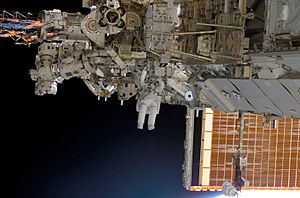
The astronauts performed four spacewalks (EVAs) during the mission.
- EVA 1 (August 11): Rick Mastracchio and Dave Williams installed the S5 truss segment onto the station. This made the ISS much heavier. The spacewalk lasted 6 hours and 17 minutes.
- EVA 2 (August 13): Rick Mastracchio and Dave Williams removed a broken CMG and installed a new one. The old CMG was stored outside the station to be brought back to Earth later. This spacewalk lasted 6 hours and 28 minutes.
During this spacewalk, Mastracchio's suit showed a high carbon dioxide alarm, but it was just a sensor problem. NASA confirmed his suit was safe.
- EVA 3 (August 15): Rick Mastracchio and Clayton Anderson moved an antenna and other equipment. This spacewalk was cut short because Mastracchio noticed a small tear on his glove. NASA decided to end the spacewalk early to be safe. The spacewalk lasted 5 hours and 28 minutes.
NASA later checked the glove and found the tear was into the second layer of material. They decided it was a precaution to end the spacewalk.
- EVA 4 (August 18): Dave Williams and Clayton Anderson completed more tasks, including retrieving experiments from outside the station. This spacewalk was shortened by two hours because of Hurricane Dean heading towards Houston. It lasted 5 hours and 2 minutes.
During this spacewalk, the astronauts got an amazing view of Hurricane Dean from space.
Decision on Tile Damage
NASA spent several days studying the damaged heat shield tile. They used special tests and computer models to see how the damage would affect the shuttle during its return to Earth. On August 16, NASA announced that the damage was not a threat to the crew's safety. They decided that no repair was needed. The risks of doing a spacewalk to fix it were higher than the risk of leaving it as it was.
Commander Kelly said he was "100 percent comfortable" with NASA's decision. He trusted the engineers and felt safe.
Returning Home
On August 19, Endeavour successfully undocked from the International Space Station. NASA decided not to do the usual fly-around of the station to give the crew more rest. After undocking, the crew used the robotic arm to inspect the shuttle's wings and nose cap one last time.
On August 20, the crew prepared for landing. They practiced landing procedures and talked to students in Canada. The weather forecast for landing in Florida looked good.
Landing Day: August 21
On August 21, the crew got ready to land. They closed the cargo bay doors and put on their special reentry suits. At 11:08 AM UTC, they were given the "go" for the deorbit burn. This engine burn slowed Endeavour down so it could begin its descent to Earth.
Endeavour landed safely at Kennedy Space Center at 12:33:20 PM UTC. The landing was perfect.
After landing, experts checked the shuttle. The damaged heat shield tile looked even better than expected. The damage was less than what the tests had shown. NASA Administrator Michael D. Griffin said that the ISS was about 60% complete after this mission.
When asked about the tile damage, Commander Kelly said he wasn't worried about it at all. He said he was "underwhelmed by it" when he saw it after landing.
You know, there's a great sense of pride to be able to be involved in a human endeavor that takes us all a little bit farther, when you look down and see our Earth... and you realize what we are trying to do as a human race, it's pretty profound.
—Barbara Morgan
Spacewalk Details
Here are the details of the spacewalks (EVAs) performed during the STS-118 mission:
| EVA | Spacewalkers | Start (UTC) | End | Duration | Mission |
|---|---|---|---|---|---|
| EVA 1 | Rick Mastracchio Dave Williams |
11 August 2007 16:28 UTC | 11 August 2007 22:45 UTC | 6 hours, 17 minutes | Installed the S5 truss segment and prepared a radiator. |
| EVA 2 | Rick Mastracchio Dave Williams |
13 August 2007 15:32 UTC | 13 August 2007 22:00 UTC | 6 hours, 28 minutes | Removed a broken gyroscope and installed a new one. |
| EVA 3 | Rick Mastracchio Clayton Anderson |
15 August 2007 14:37 UTC | 15 August 2007 20:05 UTC | 5 hours, 28 minutes | Moved an S-Band antenna, installed new equipment, and moved a cart. |
| EVA 4 | Dave Williams Clayton Anderson |
18 August 2007 14:17 UTC | 18 August 2007 19:19 UTC | 5 hours, 2 minutes | Installed a boom stand, retrieved experiments, and installed an antenna. |
Wake-up Songs
NASA has a tradition of playing music to wake up astronauts in space. These songs are often chosen by their families and have a special meaning.
| Flight Day | Song | Artist | Played for | Links |
|---|---|---|---|---|
| Day 2 | "Where My Heart Will Take Me" | Russell Watson | Rick Mastracchio | wav mp3 |
| Day 3 | "Mr. Blue Sky" | Electric Light Orchestra | Scott Kelly | wav mp3 |
| Day 4 | "Gravity" | John Mayer | Charles O. Hobaugh | wav mp3 |
| Day 5 | "Up!" | Shania Twain | Dave Williams | wav mp3 |
| Day 6 | "Outa-Space" | Billy Preston | Alvin Drew | wav mp3 |
| Day 7 | "Happy Birthday to You" | Tracy's nieces and nephews | Tracy Caldwell, for her 38th birthday | wav mp3 |
| Day 8 | "Good Morning World" | Adam, Barabara's son | Barbara Morgan | wav mp3 |
| Day 9 | "Times Like These" | Foo Fighters | Rick Mastracchio | wav mp3 |
| Day 9 | "Black Horse and the Cherry Tree" | KT Tunstall | Tracy Caldwell | wav mp3 |
| Day 11 | "Learn to Fly" | Foo Fighters | Al Drew | wav mp3 |
| Day 12 | "Teacher, Teacher" | 38 Special | Barbara Morgan | wavmp3 |
| Day 13 | "Flying" | Long John Baldry Trio | Dave Williams | wavmp3 |
| Day 14 | "Homeward Bound" | Simon and Garfunkel | entire crew | wavmp3 |
Images for kids
-
Astronaut Clayton Anderson, Expedition 15 flight engineer, uses a digital camera to expose a photo of his helmet visor during the mission's third EVA.
-
Morgan and Caldwell pose for a tribute photo, holding a picture of Expedition 15 crewmembers, and behind them are tributes to their classmate Patty Hilliard Robertson and the STS-107 crew.
See also
 In Spanish: STS-118 para niños
In Spanish: STS-118 para niños
 | Bessie Coleman |
 | Spann Watson |
 | Jill E. Brown |
 | Sherman W. White |


